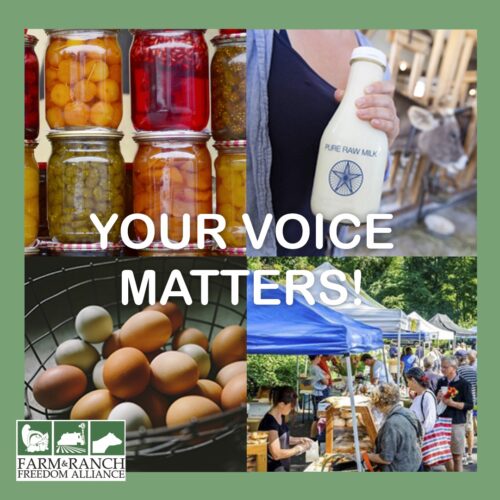2025 Texas Legislative Session Priorities

UPDATES: Links to Legislative Session Priorities in process
- Texas House Hearings for Cottage Foods & Raw Milk Bills: Link to HEARING and RESULTS of Hearing
- Texas Senate Hearing for Locally Raised Eggs Bill
[Download a pdf version of priorities listed below]
The current consolidated conventional food system mines our soil, contaminates our air and water, leaves many farmers constantly on the verge of bankruptcy, and produces nutrient-poor food carrying toxic residues. The system has failed farmers, workers, rural communities, consumers, and the environment – the only ones benefiting are the big corporations and their profit margins.
In contrast, small farms and food producers provide their local communities with high-quality healthy food, using methods that preserve and even restore our natural resources. Yet they continue to be hampered by regulations written by and for large-scale, consolidated agriculture. It is time to develop policies that support a resilient, diversified food system and small businesses.
Expand Options for Home-Based (Cottage) Food Businesses: SB 541/ HB 520, and HB 2588
The cottage food law has allowed thousands of Texans to start successful small food businesses, with zero reported illness outbreaks. The law allows people to make non-potentially hazardous foods in their home kitchens and sell them directly to consumers, up to $50,000 annually. FARFA supports SB 541, HB 520, and HB 2588 to expand this valuable law, support small businesses, and provide more options for consumers. Click here for more.
Provide Fair Property Taxes for Small Farmers: HB 2930/ SB 2168
When the principal use of a piece of land is agricultural, it is supposed to be taxed based on its agricultural value. The current statute works well for large producers and commodity crop growers, but no county has adopted guidelines as to what is needed for a small farm to qualify, including the many small farms growing fruits and vegetables for local markets. HB 2930 would direct the Comptroller to set guidelines for these properties, ensuring fair, statewide application of agricultural valuation provisions. Click here for more.
Improve Access to Locally Raised Eggs: HB 2953 / SB 1864
Locally raised eggs are in high demand by consumers, but grading regulations create unnecessary barriers for farmers. “Grading” involves weighing and measuring each egg, sorting them by size, and being licensed by the Department of Agriculture. Grading is a marketing issue and provides no benefits from a health or food safety perspective. Texas farmers can legally sell ungraded eggs directly to consumers, and do so at farmers’ markets all over the state – with no reported problems. But farmers can’t sell those same eggs to chefs or grocers without a grading license. HB 2953/ SB 1864 would allow farmers to sell eggs clearly labeled as “ungraded” and identifying their farm, so that consumers can make informed choices. Click here for more.
Support the Transition to Regenerative Agriculture: HB 5339
Almost all of the agricultural and food research right now is either directly corporate-funded or conducted by researchers whose departments rely heavily on corporate funding. Thus, it focuses on high-tech “solutions” such as genetically engineered crops, patented seeds, and expensive chemicals. We know from experience that regenerative agriculture methods can improve agricultural production while rebuilding our vital soil, but there are gaps in our knowledge about what tools work best for different regions and production types and how to effectively support farmers in moving to regenerative systems. HB 5339 is a groundbreaking bill that directs the Texas Higher Education Coordinating Board to establish a grant program to fund research on regenerative agriculture at universities, with an emphasis on institutions that partners with producers and organizations that implement regenerative agriculture practices and that don’t receive a significant portion of their funding from pesticide companies.
Protect Small Farmers and Food Businesses from Duplicative Permit Requirements, HB 5459
Farmers and local food producers with a food manufacturer or food retailer permit from the Department of State Health Services (DSHS) can sell their products to consumers in diverse areas. But if there is a local health department, they must obtain a permit from the local department and pay additional fees, even though the substantive regulations governing them are the same. This is particularly challenging for farmers who sell at multiple farmers’ markets or small venues, because they may need to obtain permits from 3 or 4 jurisdictions. FARFA urges the Legislature to pass a bill that allows small food businesses (under $1 million in sales) to sell anywhere in the state if they have a permit from DSHS.
Allow Off-Farm Raw Milk Sales Direct to Consumers: HB 1669
Currently, Grade A Raw for Retail dairy farms can sell raw milk to consumers only on their farm. The farmer may deliver the milk to the buyer anywhere in the state, but can’t sell on-site even at a farmers’ market. HB 1669 allows licensed farmers to sell their products directly to consumers anywhere in the state. It also specifically allows individuals and nonprofits to act as coordinators for people to buy raw milk as a group, a practice that is already occurring. Click here for more.
Protecting Soils and Children: HB 1637 & HB 1674
HB 1637 prohibits the use of glyphosate (a known carcinogen that damages the gut microbiome) on school grounds. The bill also bans several harmful food dyes from school lunches.
FARFA also supports HB 1674 to protect farmers and ranchers from having their land contaminated by PFAS “forever chemicals.”
Transparency in Meat Labeling: HB 1374, HB 1385, and SB 823
Americans deserve to know where their food comes from. FARFA supports HB 1374, HB 1385, and SB 823 to require meat to be labeled with its country of origin.
###
Judith McGeary, Founder and Executive Director / Farm and Ranch Freedom Alliance, Judith@FarmAndRanchFreedom.org